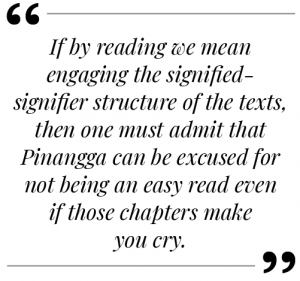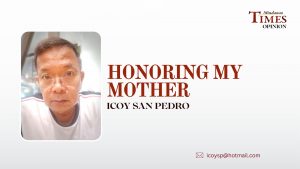By Ismael P. Magadan, Jr.
 TAGBILARAN, Bohol (MindaNews) — Well, what can I say?
TAGBILARAN, Bohol (MindaNews) — Well, what can I say?
It was not easy, really, to review this work if by “review” we mean squeezing the juice out of this hive. To be sure, while many a wonderful note can be spoken of about this volume, Pinangga has this subversion to resist rationale determinants. So, the safe step is to hope to arrive at the book’s universal message by engaging first the impressions immanent in every chapter.
Nevertheless, let me go on with this inadequate note I prepared “sa panahon sa kagoliyang.”
In Pinangga, Melchore Morante yet again nailed another epic read. Having read Morante for some time now, I would like to position Pinangga as a timely sequel to Sugilanon, which hit the press during the inception of the global pathos called COVID-19.
Pinangga is such a sweet word but in his anthology, Morante just painted it grim, and rightly so.
If by reading we mean engaging the signified-signifier structure of the texts, then one must admit that Pinangga can be excused for not being an easy read even if those chapters make you cry. The readers must be forewarned of the book’s romantic pretensions. Spoiler alert, yes, instead there are plenty of heartbreaks in this volume. And, if by entertainment we mean the parochial carnivalesque moments of ecstasies, then, hardly it does.
Pinangga is rather nostalgic. And the weight of melancholia could be felt enveloping Morante’s anthology. But the fact that it does suggest optimistic promises is what makes it an enticing piece. Having done so, Morante invites the readers to discern for a better conclusion for those poignant stories which of course by virtue of historical necessity translate as our present. Morante’s past juxtaposes with our present. And we, readers, automatically become part of those stories quite non-figuratively.
Although only little does Pinangga tell of romance, it inspires immanent criticism of the present with a stark reference to the past. How far have we as a nation evolved since? Has the Catholic church together with her ecumenical siblings remained steadfast in their call to the preferential option for the poor, and lobby on their behalf? Or had they already succumbed to the perks coming from the elitist temptations as personified by ex- Congressman Marcia in the chapter called, “May kaugmaon ba ang mga Manobo?” [p.150] How do the local churches today behave toward the conditions of the faithful who live in the margins? How have the Lumad coped with their social integration amidst the unbridled technological advancements? What remains of the prospects for the conservation of the Lumad identity alongside the incessant adaptation of popular foreign culture, of K-pop for example? And apart from their rights to their ancestral domain, what else is with the Lumad to save and promote? Checked against the seeming demise of the democratic promises and ideals, how far can politics of identity bring the Lumad struggle? Which forms of violence in Pinangga re-emerge today, and what enables this parallel resurgence?
These are one too many a question, of course.
But perhaps the generation who did not witness the atrocities, nay the barbarism, of Martial Law could be lucky enough. Well, I belong to that generation. I must be lucky.
What is there to miss anyway?
For one, Pinangga bodes well in attempting to erase, in a literary fashion, the myth of the golden era of the old Marcos’ regime. It was not golden; it was gloomy as Morante’s stories unfolded. The abductions of political activists, gruesome military brutality, corruption done by Marcos’ cronies, among others, could be seen rampant. The Marcos regime furloughed a “state of exception” if I may borrow a concept from the Italian philosopher Giorgio Agamben. The remnants of which regime haunts us today, teasing us of its ordained ability to yet again enjoy another political hegemony.
Nevertheless, Pinangga takes us back to a courageous past. It tells those stories of love – frustratingly not romance in the most commodified sense of the word – and the background structures which either made or broke them were also being accounted for. Morante’s penchant for those poignant memories breathes life to this anthology.
(MindaViews is the opinion section of MindaNews. Ismael P. Magadan, Jr. is a Philosophy Instructor at the Bohol Island State University – Tagbilaran/Immaculate Heart of Mary Seminary – Tagbilaran.)




